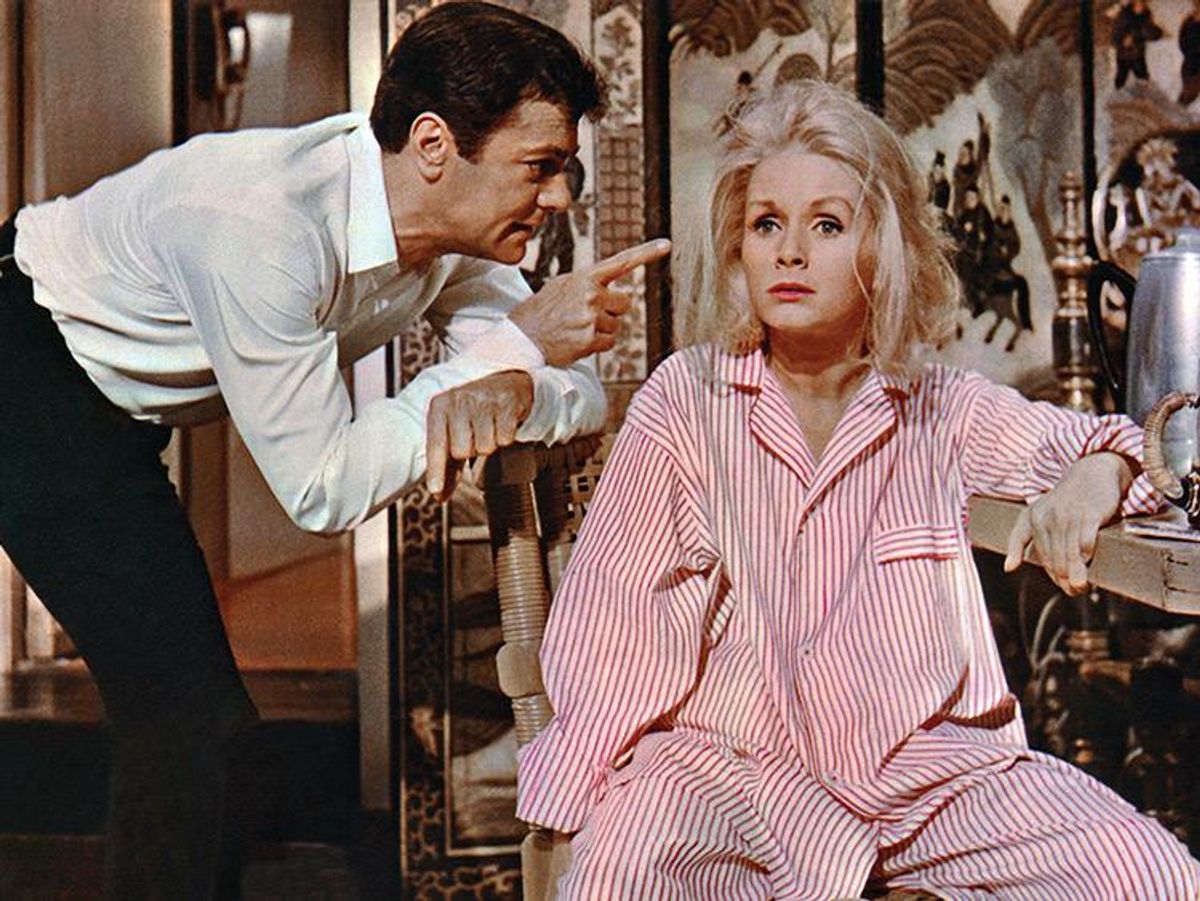Armond White
Transgender & Transgenre: Inside Hollywood’s First Trans Screwball Farce

The 1964 film Goodbye Charlie said hello to sexual liberation.
September 21 2016 11:10 AM EST
May 01 2018 11:58 PM EST
By continuing to use our site, you agree to our Private Policy and Terms of Use.

The 1964 film Goodbye Charlie said hello to sexual liberation.
Courtesy of Everett Collection.
Hollywood classics like My Man Godfrey, The Awful Truth, Bringing Up Baby, and The Lady Eve were the greatest romantic screwball comedies because they conveyed courtship rituals as farce. These conventions still give lasting pleasure even when the characters are not strictly heterosexuals, as in the 1964 film Goodbye Charlie, Hollywood's first transgender screwball farce. Goodbye Charlie (based on a play by George Axelrod and remade by Blake Edwards in 1991 as Switch, starring Ellen Barkin at her butchest) capitalized on the way the first screwballs celebrated more than marriage and idealized the very idea of sexual bliss.
When philandering screenwriter Charlie Sorel is killed by a competing suitor and then reincarnated as a fetching blonde (Debbie Reynolds), karma proves to be a bitch -- especially in Hollywood, where karma represents wish fulfillment. Gay, transgender, and queer people were rarely acknowledged outright in Hollywood movies. But Hollywood filmmakers -- especially ones with gay history, like Goodbye Charlie's director, Vincente Minnelli -- were aware of the desire, ruses, and fluid identities that occurred in their world. Minnelli gave that world an extraordinary elegance and pathos.
Reynolds may have given her strongest film performance as born-again Charlie. Puzzlement about her new bosomy anatomy proved ironic for viewers given Reynolds's own career profile as a desirable teen star (I Love Melvin, Singin' in the Rain, Susan Slept Here) and her '50s tabloid fame as singer Eddie Fisher's blushing bride and then Elizabeth Taylor's rival for Fisher's affection. There's also those persistent lesbian rumors, which Reynolds, under Minnelli's expert guidance, nods to with striking aplomb.
Reynolds's manspreading gestures, sharp-tongued macho delivery, and ass-slapping cheekiness tease the butch-femme dichotomy. She asks: What is masculine? What is feminine? How do the two meet, and what does that synthesis mean? These questions, in a romantic-comedy context, create the screwball squirreliness in which Charlie's old friend George (Tony Curtis) finds himself seduced beyond fraternal feelings. Curtis, himself a '50s hetero heartthrob -- who cross-dressed in the gender-bending Some Like It Hot -- displays some serious sexual confusion here. Goodbye Charlie would be nothing without both Curtis and Reynolds daring to suggest true love within gender transference.
Goodbye Charlie said hello to sexual liberation. Note Reynolds's soliloquy: "I'm not Charlie. I'm whatever this is. I don't know what I am, a throwback, a werewolf, something from the deep lagoon." Her remorse evokes the slow learning and sorrow Liz Taylor showed in Cat on a Hot Tin Roof. Charlie grows into her femininity just as George grows into deeper levels of friendship.
There's a moral: "Never judge anyone by appearances only." This goes to the soul of the current transgender conversation. The farcical plot includes Charlie's flirtation with a rich mama's boy (straitlaced '50s crooner Pat Boone, playing the kind of role Rudy Vallee had in Preston Sturges screwballs).
But before that intrigue ends, Reynolds and Minnelli highlight the pathos of a socially constrained male -- the same gender-identity insight that made Minnelli's 1956 Tea and Sympathy both infamous and indispensable. The scene in which Boone leads Reynolds through his family's hidden wine cellar and she marvels at the vintage varieties is a rare contemplative moment for the farce genre.
The new wine of Goodbye Charlie explodes screwball comedy's old bottle. It anticipates the LBGTQ future.
Like what you see here? Subscribe and be the first to receive the latest issue of Out. Subscribe to print here and receive a complimentary digital subscription.